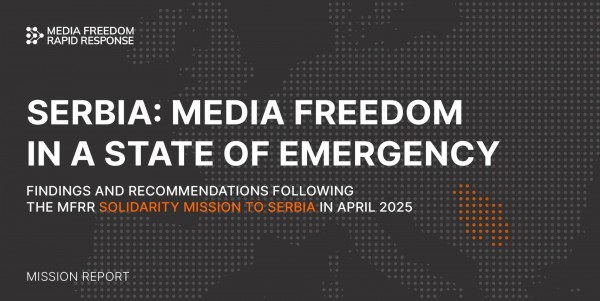On the occasion of the “Publisher’s Day”, the annual conference of the Swedish Publishers Association (Svenska Tidningsutgivareförening, TU) the Director of the International Press Institute , Johann P. Fritz, gave a lecture on the power struggle over the media in Central and Eastern Europe.
He stress that one could no longer speak of the general situation of the media in the East as this region no longer formed one block. Specific developments apply only to the Central European countries, the Balkan region, the new countries of the former Yugoslavia, the Baltic states or the other regions of the former Soviet Union. Yet the International Press Institute also identified some basic issues and trends which are common to the whole region.
- Politicians and governments are increasingly asking the media to perform ideological and educational tasks. As in the time of the communist regimes, the media is asked to “encourage the public”, “attain positive interpretation”. “emphasize success” and “promote an “understanding of the difficulties”.
- Nationalistic tendencies are gaining in significance; criticism is seen as a violation of the honour of the country and interpreted as a disparagement of the state. Critics are considered “bad patriots, who do not contribute towards the building of their country.”
- Journalists are in a difficult position; work conditions are poor, job security is uncertain, financial reward is bad, political intervention as well as pressures exerted by advertising clients are the order of the day. The result: journalists take sides – as in the past – and practice self censorship. In addition, there is too much commentary and polemic, rather than news, research and analysis.
- Foreign investment, although often seen by politicians and journalistic organizations as a negative influence, has definitely had a positive effect: capital investment, modern technological equipment and above all, a clear distinction between editorial and managerial responsibilities. Furthermore, these media run internal and external vocational training courses and practice objective journalism according to Western standards of journalism and are, therefore, almost always among the most successful in their respective countries. Privatisation programs with foreign capital investment, which result in guarantees for independent editorial offices, are therefore to be welcomed.
- In addition to political pressures, publishers and journalists of the critical media are, in increasing numbers, also being threatened by criminal gangs. Research on crime (especially bribery and corruption) are often answered with personal threats, and even with attacks on journalists. Thus, a situation has evolved which is similar to that of the media and the drug mafia in South America.
- The print media is relatively free and independent. The pressure on critical print media is mostly of an economic nature: withdrawal of state subsidies, hindrance of printing companies and distribution systems (especially in countries where the large publishers and media are still under state control), advertising boycotts by state-controlled enterprises etc.
- Broadcasting corporations, i.e. national radio and TV companies, are –despite company structures based on western models – the most exposed to strong and direct political influence. Despite protests from national organisations of professionals and intellectuals, as well as from international press organisations, many of these institutions continue to be caught in the political fight for power.
- News agencies, the basic supplier of “raw” material to the media, still continue to be owned by the state and therefore continue to be under direct political control.
The International Press Institute (IPI) is a global network for the defence of press freedom, representing almost 2000 publishers and editors-in-chief from daily and weekly newspapers, magazines, broadcasting corporations, as well as news agencies, from a total of 68 countries. IPI will bring to the attention of the Council of Europe and the CSCE background information on the situation of the media in Central and Eastern Europe. On the basis of these findings, the supranational organisations could then demand from the governments of these countries that they adhere to the principles of freedom of the press and freedom of expression.


